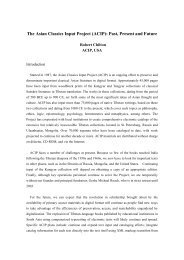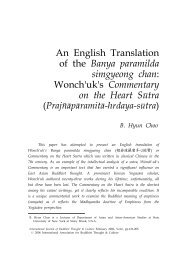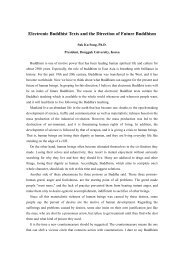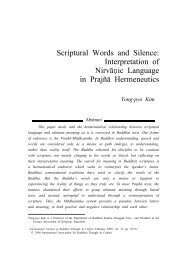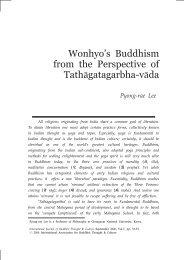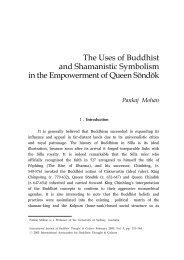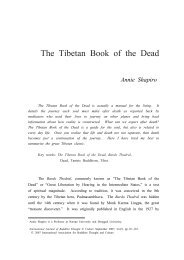Esoteric Buddhism under the KoryÅ in the Light of ... - Buddhism.org
Esoteric Buddhism under the KoryÅ in the Light of ... - Buddhism.org
Esoteric Buddhism under the KoryÅ in the Light of ... - Buddhism.org
Create successful ePaper yourself
Turn your PDF publications into a flip-book with our unique Google optimized e-Paper software.
International Journal <strong>of</strong> Buddhist Thought & Culture 81<br />
seen as political constructs <strong>in</strong> <strong>the</strong> manner <strong>in</strong> which earlier scholarship<br />
presented <strong>the</strong>m, <strong>the</strong> revisionist writ<strong>in</strong>gs have unfortunately tended to<br />
obfuscate <strong>the</strong> concrete issue <strong>of</strong> state-protect<strong>in</strong>g <strong>Buddhism</strong> <strong>in</strong> <strong>the</strong><br />
historical cont<strong>in</strong>uum. 48<br />
The fact rema<strong>in</strong>s that dur<strong>in</strong>g <strong>the</strong> Koryŏ <strong>Buddhism</strong> DID serve as a<br />
supporter <strong>of</strong> <strong>the</strong> k<strong>in</strong>gdom and its rul<strong>in</strong>g families <strong>in</strong> its capacity as<br />
spiritual mediator between <strong>the</strong> k<strong>in</strong>gs and <strong>the</strong> div<strong>in</strong>e powers represented<br />
by <strong>Buddhism</strong>. There can be no doubt <strong>of</strong> this phenomena historically<br />
speak<strong>in</strong>g. 49 The modus through which this reciprocal relationship has<br />
been ma<strong>in</strong>ta<strong>in</strong>ed was primarily by hav<strong>in</strong>g <strong>Esoteric</strong> Buddhist rituals<br />
performed at important temples, and <strong>in</strong>deed <strong>in</strong>side <strong>the</strong> royal palace.<br />
Anybody who cares to look at <strong>the</strong> abundant, primary material conta<strong>in</strong>ed<br />
<strong>in</strong> <strong>the</strong> KS, most <strong>of</strong> which is directly connected with <strong>the</strong> royal house, as<br />
well as a substantial amount <strong>of</strong> <strong>the</strong> extant epigraphical sources, will<br />
immediately acknowledge this fact. Moreover, if we remove <strong>the</strong> overt<br />
political aspirations <strong>of</strong> some <strong>of</strong> <strong>the</strong> Korean scholarship on hoguk pulgyo<br />
from <strong>the</strong> Park era, we shall f<strong>in</strong>d that most <strong>of</strong> <strong>the</strong> sources <strong>the</strong>y used, do<br />
hold water. 50 Their ma<strong>in</strong> problems are chiefly related to <strong>the</strong> manner <strong>in</strong><br />
which <strong>the</strong>y transferred/transposed <strong>the</strong> Koryŏ reality unto <strong>the</strong> political<br />
context <strong>of</strong> 1960’s Korea.<br />
When compar<strong>in</strong>g Koryŏ with its neighbours <strong>in</strong> regard to hoguk<br />
pulgyo, it is immediately clear that <strong>Buddhism</strong> served as <strong>the</strong> spiritual<br />
guarantor for national security <strong>the</strong>re as well. While it is not sufficiently<br />
clear to which extent <strong>Buddhism</strong> was equally important <strong>in</strong> <strong>the</strong> respective<br />
state apparatuses <strong>of</strong> <strong>the</strong> Liao and J<strong>in</strong> states due to lack<strong>in</strong>g primary<br />
moderate revisionist view, see Nam (2003).<br />
48 A good example <strong>of</strong> this can be found <strong>in</strong> <strong>the</strong> writ<strong>in</strong>gs <strong>of</strong> Kim (1995).<br />
49 For a useful comparison with <strong>the</strong> Song dynasty see <strong>the</strong> f<strong>in</strong>d<strong>in</strong>gs <strong>of</strong> Halper<strong>in</strong> (1999).<br />
50 Most <strong>of</strong> <strong>the</strong> 14th issue <strong>of</strong> PH from 1977 was devoted to <strong>the</strong> issue <strong>of</strong> hoguk pulgyo, and many<br />
<strong>of</strong> <strong>the</strong> articles appear<strong>in</strong>g <strong>the</strong>re are, despite <strong>the</strong>ir political tendencies, based on au<strong>the</strong>ntic<br />
scholarship. I do not wish to ignore <strong>the</strong> fact that <strong>the</strong> scholars <strong>in</strong> question were actively<br />
participat<strong>in</strong>g <strong>in</strong> <strong>the</strong> propaganda <strong>of</strong> <strong>the</strong> Park regime. However, my <strong>in</strong>tention is simply to po<strong>in</strong>t<br />
out that we need to implement a more critical and discern<strong>in</strong>g view on <strong>the</strong>ir writ<strong>in</strong>gs and <strong>the</strong><br />
historical period <strong>in</strong> which <strong>the</strong>y were produced.



